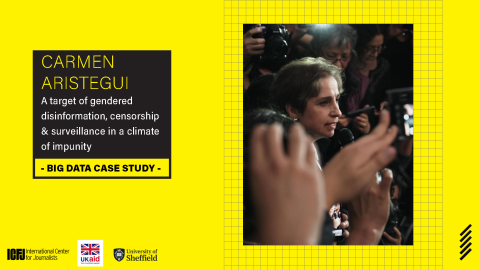
Online violence against female journalists is a horrific and deliberate effort to silence the voices of women. ICFJ is a leading global organization researching this crisis – and developing solutions to prevent it.
Our research, led by ICFJ’s Deputy Vice President for Global Research Julie Posetti, Ph.D., shows how the abuse:
- is coordinated and fuelled by government actors;
- is enabled by social media platforms; and
- inflicts deep harm, even driving women out of journalism.
At ICFJ, we are now developing an Online Violence Alert and Response System to detect, monitor and alert key responders to high-risk cases of online violence – which can lead to violence offline.
With our partners, we conduct big-data case studies on the attacks against women such as Nobel Peace Prize winner Maria Ressa of the Philippines and most recently, intrepid Mexican investigative journalist Carmen Aristegui. She has been the victim of targeted disinformation campaigns fueled by successive Mexican governments. Surveillance efforts even targeted her teenage son while he was studying in the U.S.
Ressa has noted that ICFJ’s work helped her, and her outlet, Rappler, fight her attackers, who had a clear goal: to tear down her credibility as a journalist. Last month the OSCE published ICFJ’s new guide, which reveals 15 flashpoints that signal the risk of escalation to offline harm.
"Kudos for the work you've been doing,” Polish journalist Natalia Zaba, who covers the Balkans and who has been a victim of online abuse herself, told us during the launch of the guide. “It is extremely important you shed some light over it. I feel endlessly grateful for what you did."
To learn more about our research, check out our book-length report with the support of UNESCO, The Chilling, and case studies about five women journalists facing online violence.